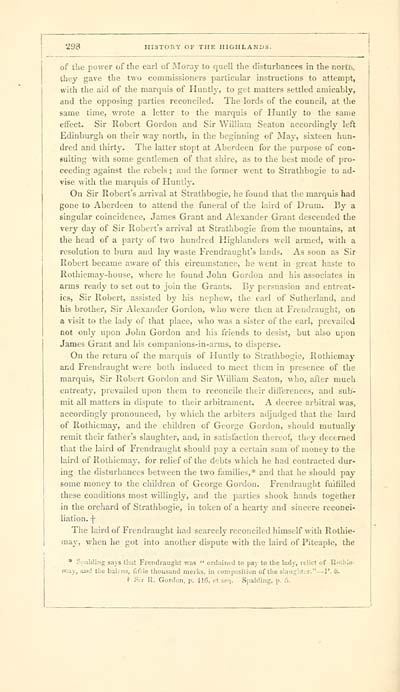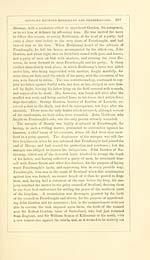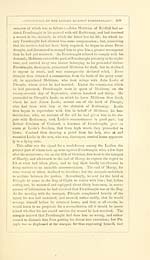Download files
Complete book:
Individual page:
Thumbnail gallery: Grid view | List view

'298 HISTOriY OF THE HIGHLANDS.
of the power of the earl of Moray to quell the disturbances in the nortn,
Ihey gave the two commissioners particular instructions to attempt,
with the aid of the marquis of Huntly, to get matters settled amicably,
and the opposing parties reconciled. The lords of the council, at the
same time, wrote a letter to the marquis of Huntly to the same
effect. Sir Robert Gordon and Sir William Seaton accordingly left
Edinburgh on their way north, in the beginning of INIay, sixteen hun-
dred and thirty. The latter stopt at Aberdeen for the purpose of con-
sulting with some gentlemen of that shire, as to the best mode of pro-
ceeding against the rebels ; and the former went to Strathbogie to ad-
vise with the marquis of Huntly.
On Sir Robert's .arrival at Strathbogie, he found that the marquis had
gone to Aberdeen to attend the funeral of the laird of Drum. By a
singular coincidence, James Grant and Alexander Grant descended the
very day of Sir Robert's arrival at Strathbogie from the mountains, at
the head of a party of two hundred Highlanders well armed, with a
resolution to burn and lay waste Frendraught's lands. As soon as Sir
Robert became aware of this circumstance, he went in great haste to
Rothiemay-house, where he found John Gordon and his associates in
arms ready to set out to join the Grants. By persuasion and entreat-
ies. Sir Robert, assisted by his nephew, tlie earl of Sutherland, and
his brother. Sir Alexander Gordon, who were tlien at Frendraught, on
a visit to the lady of that place, who was a sister of the earl, prevailed
not only upon John Gordon and his friends to desist, but also upon
James Grant and his companions-in-arms, to disperse.
On the return of the marquis of Huntly to Strathbogie, Rothiemay
and Frendraught were both induced to meet them in presence of the
marquis. Sir Robert Gordon and Sir W'illiam Seaton, who, after much
entreat}', prevailed upon them to reconcile their differences, and sub-
mit all matters in dispute to their arbitrament. A decree arbitral was,
accordingly pronounced, by which the arbiters adjudged that the laird
of Rothiemay, and the children of George Gordon, should mutually
remit their father's slaughter, and, in satisfaction thereof) they decerned
that the laird of Frendraught should pay a certain sum of money to the
laird of Rothiemay, for relief of the debts which he had contracted dur-
ing the disturbances between the two families,* and that he should pay
some money to the children of George Gordon. Frendraught fulfilled
these conditions most willingly, and the parties shook liands together
in the orchard of Strathbogie, in token of a hearty and sincere reconci-
liation, f
The laird of Frendraught had scarcely reconciled himself with Rothie-
may, when he got into another dispute with the laird of Pitcaple, the
• Riiuldiiig says tliat Frendrauglit was " ordained to pay to the lady, iclid of R<>:li;o
rnay, mid tlie bail lis, fiiMe tliousand merks. in composition of tlie slaii;liti:r." — 1'. 6.
t .Sir IJ. Gordon, p. 116, rt sen. Spalding, p. 3.
of the power of the earl of Moray to quell the disturbances in the nortn,
Ihey gave the two commissioners particular instructions to attempt,
with the aid of the marquis of Huntly, to get matters settled amicably,
and the opposing parties reconciled. The lords of the council, at the
same time, wrote a letter to the marquis of Huntly to the same
effect. Sir Robert Gordon and Sir William Seaton accordingly left
Edinburgh on their way north, in the beginning of INIay, sixteen hun-
dred and thirty. The latter stopt at Aberdeen for the purpose of con-
sulting with some gentlemen of that shire, as to the best mode of pro-
ceeding against the rebels ; and the former went to Strathbogie to ad-
vise with the marquis of Huntly.
On Sir Robert's .arrival at Strathbogie, he found that the marquis had
gone to Aberdeen to attend the funeral of the laird of Drum. By a
singular coincidence, James Grant and Alexander Grant descended the
very day of Sir Robert's arrival at Strathbogie from the mountains, at
the head of a party of two hundred Highlanders well armed, with a
resolution to burn and lay waste Frendraught's lands. As soon as Sir
Robert became aware of this circumstance, he went in great haste to
Rothiemay-house, where he found John Gordon and his associates in
arms ready to set out to join the Grants. By persuasion and entreat-
ies. Sir Robert, assisted by his nephew, tlie earl of Sutherland, and
his brother. Sir Alexander Gordon, who were tlien at Frendraught, on
a visit to the lady of that place, who was a sister of the earl, prevailed
not only upon John Gordon and his friends to desist, but also upon
James Grant and his companions-in-arms, to disperse.
On the return of the marquis of Huntly to Strathbogie, Rothiemay
and Frendraught were both induced to meet them in presence of the
marquis. Sir Robert Gordon and Sir W'illiam Seaton, who, after much
entreat}', prevailed upon them to reconcile their differences, and sub-
mit all matters in dispute to their arbitrament. A decree arbitral was,
accordingly pronounced, by which the arbiters adjudged that the laird
of Rothiemay, and the children of George Gordon, should mutually
remit their father's slaughter, and, in satisfaction thereof) they decerned
that the laird of Frendraught should pay a certain sum of money to the
laird of Rothiemay, for relief of the debts which he had contracted dur-
ing the disturbances between the two families,* and that he should pay
some money to the children of George Gordon. Frendraught fulfilled
these conditions most willingly, and the parties shook liands together
in the orchard of Strathbogie, in token of a hearty and sincere reconci-
liation, f
The laird of Frendraught had scarcely reconciled himself with Rothie-
may, when he got into another dispute with the laird of Pitcaple, the
• Riiuldiiig says tliat Frendrauglit was " ordained to pay to the lady, iclid of R<>:li;o
rnay, mid tlie bail lis, fiiMe tliousand merks. in composition of tlie slaii;liti:r." — 1'. 6.
t .Sir IJ. Gordon, p. 116, rt sen. Spalding, p. 3.
Set display mode to: Large image | Transcription
Images and transcriptions on this page, including medium image downloads, may be used under the Creative Commons Attribution 4.0 International Licence unless otherwise stated. ![]()
| Early Gaelic Book Collections > Ossian Collection > History of the Highlands and of the Highland clans > Volume 1 > (412) |
|---|
| Permanent URL | https://digital.nls.uk/79677541 |
|---|
| Description | Vol. I. |
|---|---|
| Shelfmark | Oss.247 |
| Additional NLS resources: | |
| Attribution and copyright: |
|
| Description | Selected books from the Ossian Collection of 327 volumes, originally assembled by J. Norman Methven of Perth. Different editions and translations of James MacPherson's epic poem 'Ossian', some with a map of the 'Kingdom of Connor'. Also secondary material relating to Ossianic poetry and the Ossian controversy. |
|---|
| Description | Selected items from five 'Special and Named Printed Collections'. Includes books in Gaelic and other Celtic languages, works about the Gaels, their languages, literature, culture and history. |
|---|

